2023年中考英语复习 第二节 动词课件(112张PPT)
文档属性
| 名称 | 2023年中考英语复习 第二节 动词课件(112张PPT) |  | |
| 格式 | pptx | ||
| 文件大小 | 1017.7KB | ||
| 资源类型 | 教案 | ||
| 版本资源 | 人教新目标(Go for it)版 | ||
| 科目 | 英语 | ||
| 更新时间 | 2023-06-02 08:18:55 | ||
图片预览

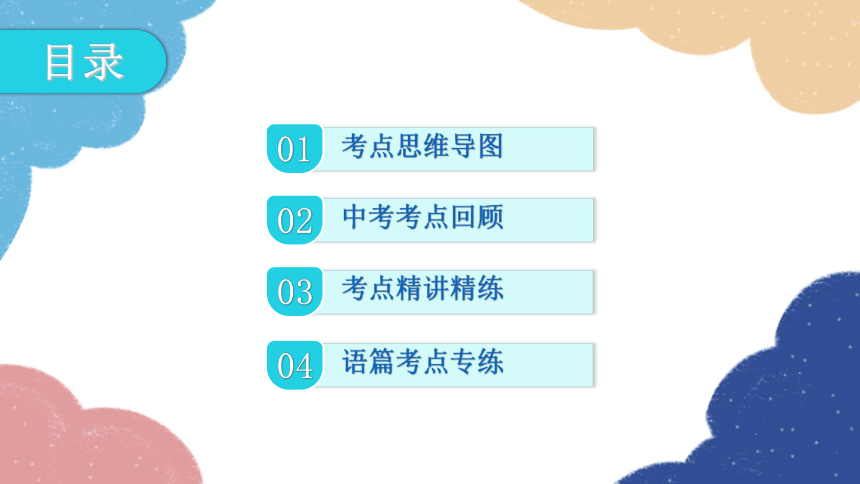
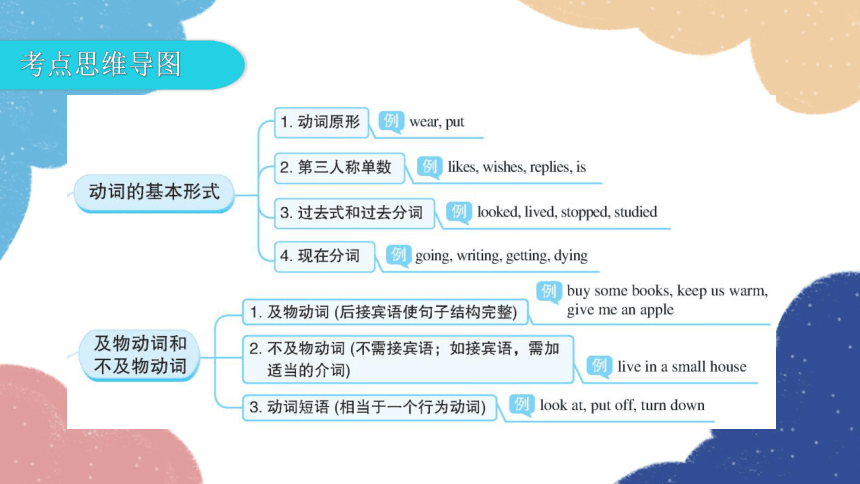
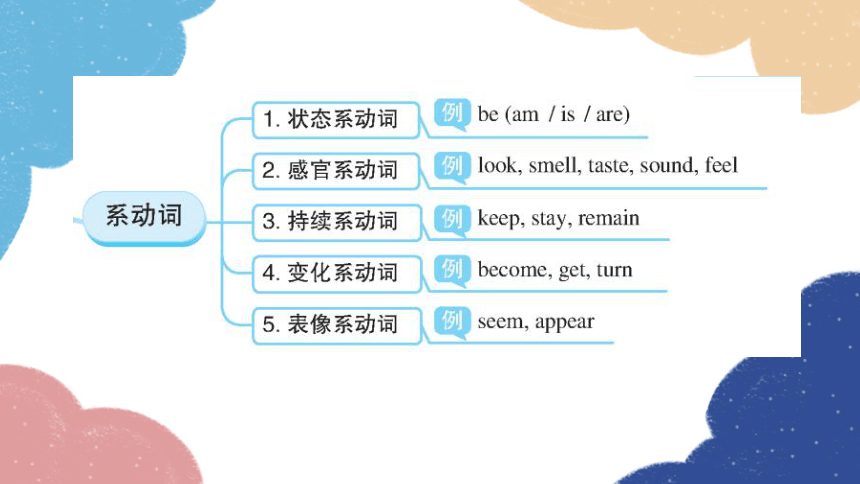
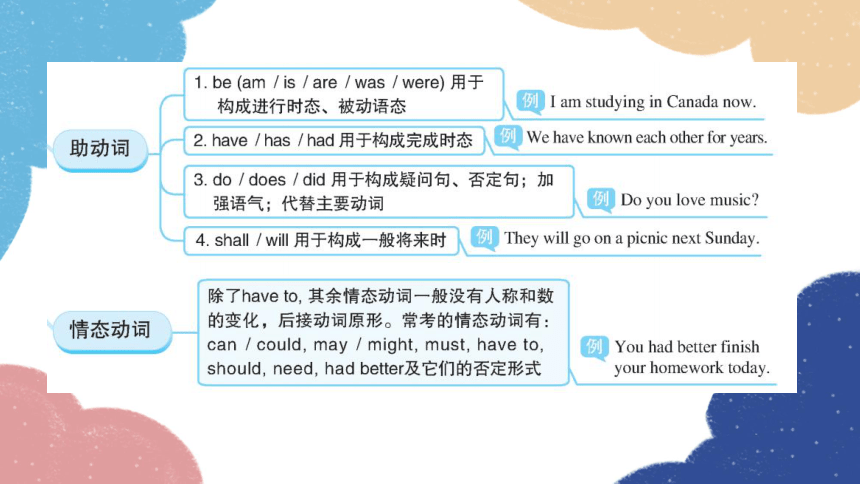
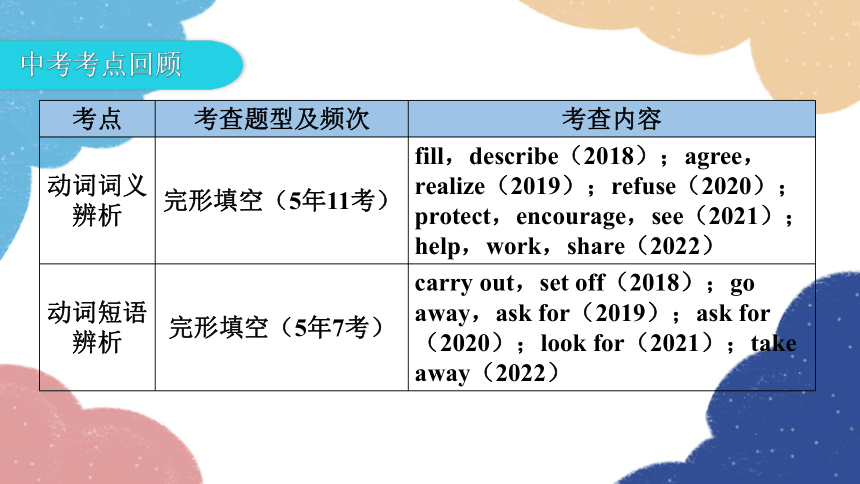
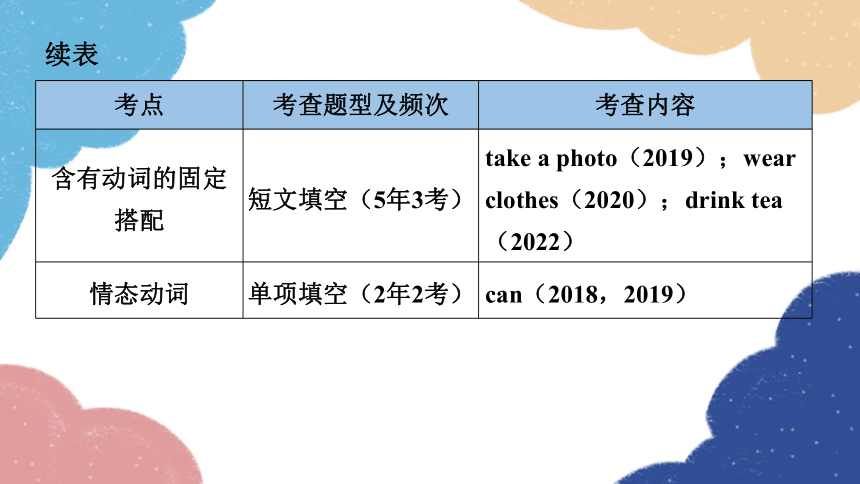
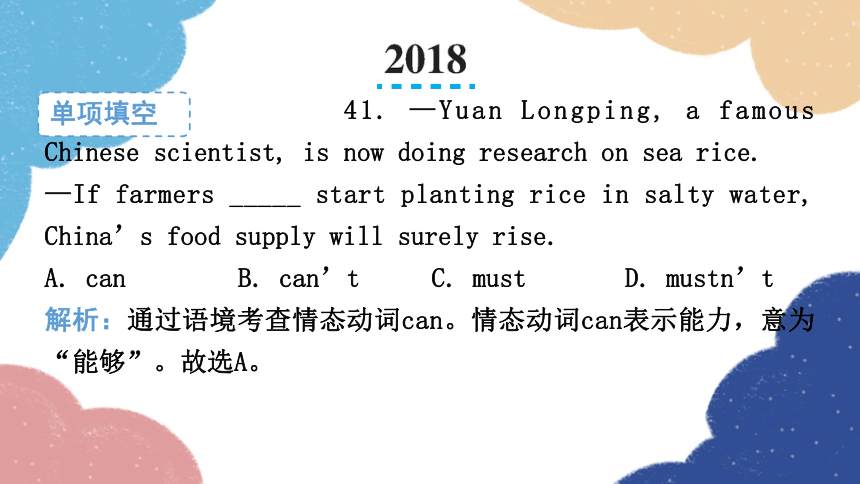
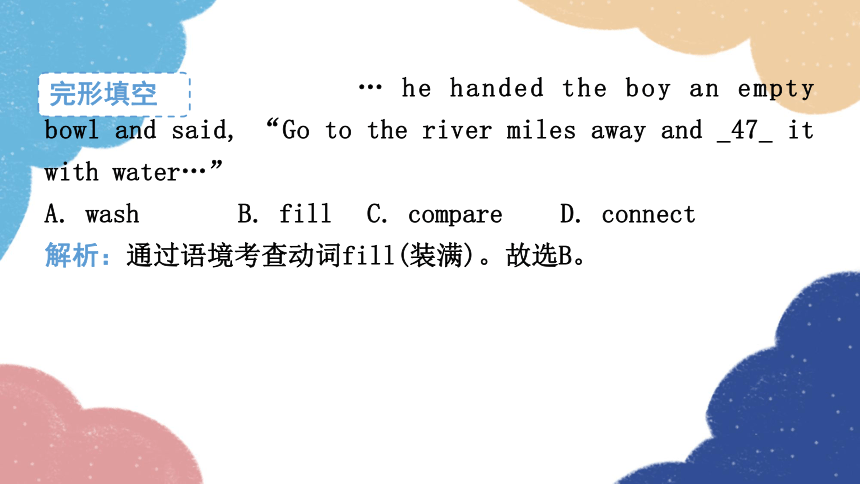
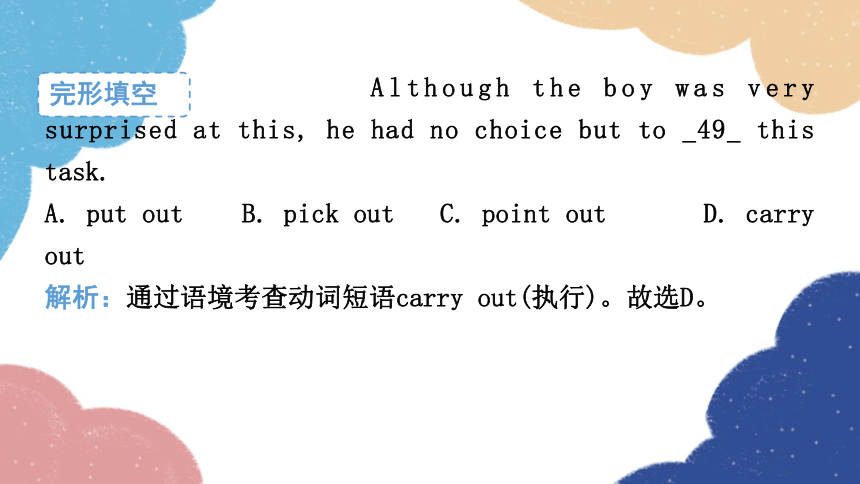
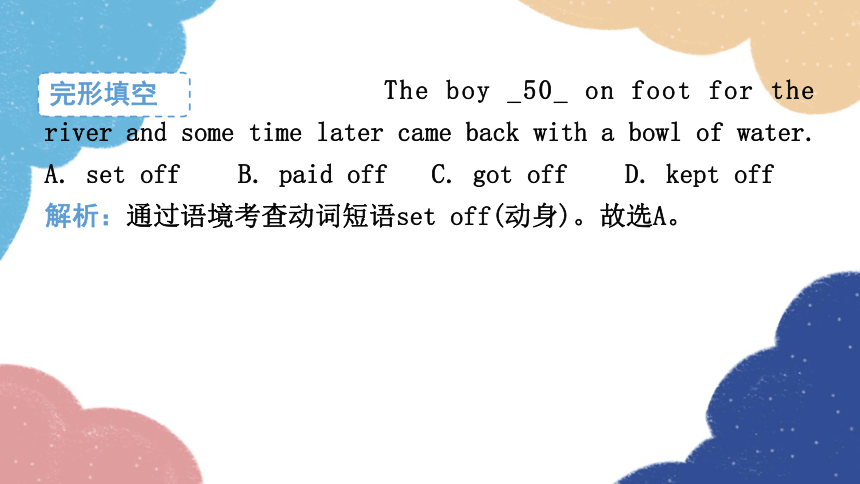
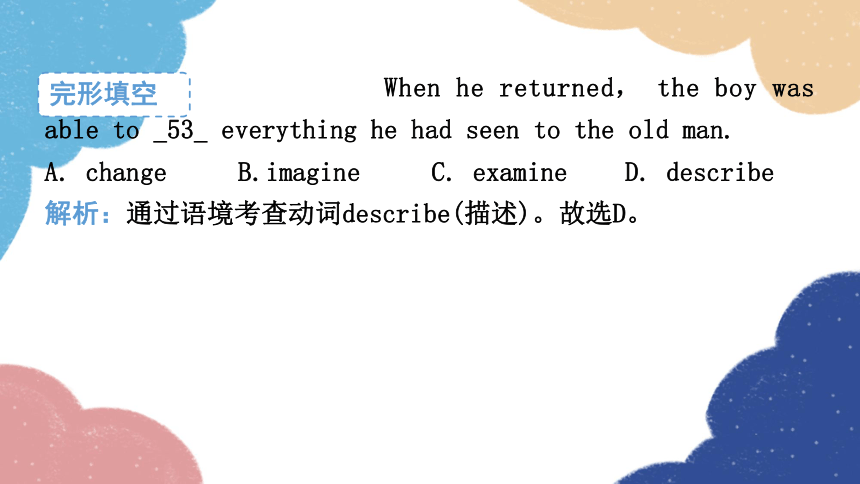
文档简介
(共112张PPT)
第一部分 基于语义的语法知识篇
词 类
第二节 动词
目录
考点思维导图
01
中考考点回顾
02
考点精讲精练
03
语篇考点专练
04
考点思维导图
中考考点回顾
考点 考查题型及频次 考查内容
动词词义辨析 完形填空(5年11考) fill,describe(2018);agree,realize(2019);refuse(2020);protect,encourage,see(2021);help,work,share(2022)
动词短语辨析 完形填空(5年7考) carry out,set off(2018);go away,ask for(2019);ask for(2020);look for(2021);take away(2022)
续表
考点 考查题型及频次 考查内容
含有动词的固定搭配 短文填空(5年3考) take a photo(2019);wear clothes(2020);drink tea(2022)
情态动词 单项填空(2年2考) can(2018,2019)
41. —Yuan Longping, a famous Chinese scientist, is now doing research on sea rice.
—If farmers _____ start planting rice in salty water, China’s food supply will surely rise.
A. can B. can’t C. must D. mustn’t
解析:通过语境考查情态动词can。情态动词can表示能力,意为“能够”。故选A。
单项填空
… he handed the boy an empty bowl and said, “Go to the river miles away and _47_ it with water…”
A. wash B. fill C. compare D. connect
解析:通过语境考查动词fill(装满)。故选B。
完形填空
Although the boy was very surprised at this, he had no choice but to _49_ this task.
A. put out B. pick out C. point out D. carry out
解析:通过语境考查动词短语carry out(执行)。故选D。
完形填空
The boy _50_ on foot for the river and some time later came back with a bowl of water.
A. set off B. paid off C. got off D. kept off
解析:通过语境考查动词短语set off(动身)。故选A。
完形填空
When he returned, the boy was able to _53_ everything he had seen to the old man.
A. change B.imagine C. examine D. describe
解析:通过语境考查动词describe(描述)。故选D。
完形填空
42. Dirty air and water are harmful.They _____ kill plants,and even people.
A.can B.can’t C.should D.shouldn’t
解析:通过语境考查情态动词can。情态动词can表示能力,意为“能够”。故选A。
单项填空
Some days they could spend hours happily together without any argument, but other days they just could not _46_ on what to do.
A. agree B. live C. depend D. try
解析:通过语境考查动词agree(同意)。故选A。
完形填空
She was getting a little unhappy and _48_, leaving Cindy alone.
A. went over B. went on C. went by D. went away
解析:通过语境考查动词短语go away(走开)。故选D。
完形填空
The next day at school, their teacher Mrs. Stone _50_ their notebooks.
A. gave away B. asked for
C. handed in D. paid for
解析:通过语境考查动词短语ask for(要求)。故选B。
完形填空
Mrs.Stone helped them _55_ that it was a good idea to take turns to decide the activity.
A. describe B. explain C. guess D. realize
解析:通过语境考查动词realize(意识到)。故选D。
完形填空
I liked him so much that I asked a visitor to _77_ a photo of that painting and me.
解析:考查含有动词的固定搭配take a photo(照相)。因空格前有不定式符号to,所以用动词原形。故填take。
短文填空
Several months ago, Mr.Smith went to a body engineering shop and _42_ a small nose.
A. cared for B. waited for
C. asked for D. sent for
解析:通过语境考查动词短语ask for(要求)。故选C。
完形填空
… brought him much trouble. He was _49_ to enter places like railway stations and airports.
A. guided B. refused C. forced D. allowed
解析:通过语境考查动词refuse(拒绝)。故选B。
完形填空
She felt sad that the kids there didn’t have new clothes to _68_ and toys to play with.
解析:考查含有动词的固定搭配wear clothes(穿衣服)。因空格前有不定式符号to,所以用动词原形。故填wear。
短文填空
Last month, a space agency(机构) told the public that they were _41_ “a planet protection officer”.
A. waking up B. looking for
C. dealing with D. talking about
解析:通过语境考查动词短语look for(寻找)。故选B。
完形填空
This job is to _47_ the earth from germs (细菌) on things brought back from other planets.
A. move B. protect C. pull D. collect
解析:通过语境考查动词protect(保护)。故选B。
完形填空
Bill ended the letter with some warm words, _48_ Sam to study hard and do well in school.
A. warning B. helping
C. ordering D. encouraging
解析:通过语境考查动词encourage(鼓励)。故选D。
完形填空
“We hope to _49_ you at the agency one day,” he wrote.
A. see B. tell C. thank D. search
解析:通过语境考查动词see(看到)。故选A。
完形填空
They are all from her garden and free for her neighbors to _42_.“It’s just lovely, like you walk by and get a beautiful gift around the corner,” said a neighbor.
A. look at B. take away
C. give up D. throw away
解析:通过语境考查动词短语take away(带走)。故选B。
完形填空
People in the community came to _44_. They brought us food and often called to make sure we were doing fine.
A. cry B. see C. help D. rest
解析:通过语境考查动词help(帮助)。故选C。
完形填空
Molly and her family had much time to _46_ in their garden.
A. play B. work C. sleep D. dance
解析:通过语境考查动词work(劳动)。故选B。
完形填空
They decided to _47_ what they grew in their garden.
A. eat B. sell C. share D. cook
解析:通过语境考查动词share(分享)。故选C。
完形填空
People there like to _73_ tea with sugar or milk in it.
解析:考查含有动词的固定搭配drink tea(喝茶)。因空格前有不定式符号to,所以用动词原形。故填drink。
短文填空
考点精讲精练
考点1
动词的基本形式
基本形式 要点及变化规则 举例
动词原形 用在情态动词、助动词、使役动词、感官动词、不定式符号to之后以及祈使句句首 All passengers must wear seat belts.所有乘客都必须系安全带。
I saw you put the key in your pocket.我看见你把钥匙放进口袋了。
续表
基本形式 要点及变化规则 举例
第三人称 单数 一般情况直接加-s like→likes,stop→stops,read→reads
以s,x,ch,sh,o结尾的动词,直接加-es wish→wishes,miss→misses,watch→watches
以辅音字母加y结尾的动词,变y为i,再加-es reply→replies,cry→cries,fly→flies
不规则变化 be→is,have→has
续表
基本形式 要点及变化规则 举例
过去式和 过去分词 一般情况直接加-ed look→looked,play→played,start→started
以e结尾的动词,直接加-d live→lived,hope→hoped,use→used
以重读闭音节 结尾,末尾只有一个辅音字母的动词,双写这个辅音字母,再加-ed stop→stopped,plan→planned,nod→nodded
以辅音字母加y结尾的动词,变y为i,再加-ed study→studied,carry→carried,worry→worried
续表
基本形式 要点及变化规则 举例
现在分词 一般情况直接加-ing go→going,ask→asking,look→looking
以不发音字母e结尾的动词,去掉e,再加-ing write→writing,make→making,take→taking
以重读闭音节 结尾,末尾只有一个辅音字母的动词,双写这个辅音字母,再加-ing get→getting,sit→sitting,put→putting
以ie结尾的动词,变ie为y,再加-ing(初中共3个) die→dying,lie→lying,tie→tying
动词的过去式、过去分词的不规则变化详见《早读本》的“英语不规则动词归类记忆表”
编者按
( )1.—Exercising is good for our health.
—You’re right. So I’d rather _____ an hour’s walk than _____ in front of the computer. (2022达州改编)
A.to take; sit B.take; sit C.take; sitting
B
( )2.In the past, people didn’t know that light _____ faster than sound. (2021龙东)
A.travels B.travelled C.travel
( )3.Smart phones _____ by Huawei are getting more and more popular around the world.
A.made B.making C.make
A
A
( )4.As we all know, a person learns many things by making mistakes and ____ them.
A.correcting B.correct C.corrected
( )5.—Would you mind not ____ noise Alice is sleeping.
—Sorry, I didn’t know. I _____ she was awake.
A.make;think B.making;thought
C.making;think
A
B
1.及物动词和不及物动词
行为动词根据能否直接跟宾语可分为及物动词(vt.)和不及物动词(vi.)。
考点2
及物动词和不及物动词
类别 要点 举例
及物动词 动词+宾语 I bought some books yesterday. 我昨天买了一些书。
动词+宾语+宾补 The sun keeps us warm. 阳光让我们温暖。
动词+双宾语 (即直接宾语和间接宾语) My mother gave me an apple. 妈妈给了我一个苹果。
续表
类别 要点 举例
不及物动词 本身有完整的意思,后不需接宾语 Something terrible has happened. 可怕的事发生了。
若不及物动词后需要接宾语,需加适当的介词 They live in a small house in Beijing. 他们住在北京的一所小房子里。
【注意】有的动词既可作及物动词,又可作不及物动词。
She sings very well. 她唱得很好。(sing作不及物动词)
She sang an English song just now. 她刚才唱了一首英文歌。(sing作及物动词)
2.动词短语
(1) 动词短语在意义上相当于一个行为动词,是由两个或两个以上的单词构成的短语。常见的动词短语有以下几种形式:
动词+介词 look at 看 worry about担心
动词+副词 put off 推迟 pick up捡起
动词+名词+介词 make friends with和……交朋友
pay attention to注意
动词+副词+介词 stay away from远离
look back at回忆;回顾
动词+介词+名词 go to school去上学 go to bed上床睡觉
【注意】 在“动词+副词”短语中,名词可放在短语的中间或后面,但代词一定要放在短语的中间。
He turned off all the lights when he left.=He turned all the lights off when he left.当他离开时,他关上了所有的灯。
He picked it up and gave it to me. 他捡起它,然后把它交给了我。
(2) 同一个动词与不同的介词或副词的搭配、不同动词与同一个介词或副词的搭配会产生不同的意义。
①同一动词+不同介词/副词
get get up 起床 get on 上车 get off 下车
get to 到达 get over 克服 get together 相聚
get on/along with与……友好相处
get ready for 为……做准备
续表
look look at 看 look like看起来像 look out 当心 look up 查阅 look after照顾 look over 检查 look through浏览 look out of 向……外看
look forward to 盼望;期盼
look down on/upon瞧不起;轻视
look for寻找(2021.41)
put put on 穿上;上演 put off 推迟 put out 熄灭 put up 张贴;搭建 put away 收好;放好
续表
turn turn on打开 turn off 关掉 turn up调大;出现 turn into变成 turn down调低;拒绝
turn out发生;结果是
take take up 占据;开始做 take off 脱掉;起飞
take out拿出 take place 发生 take over接收;接管 take after长得像 take a risk冒险 take part in参加 take in吸入;吞入 take care of照顾
take pride in 以……为傲 take away带走(2022.42)
续表
come come from 来自 come in 进来 come over 来访 come true实现 come down 落下
come across 偶然遇见 come up with想出
give give away 捐赠 give back 归还 give up放弃 give off 发出(光、热)
go go by (时间) 流逝 go off爆炸;离开 go on 继续 go over 仔细检查 go away走开(2019.48)
续表
cut cut up切碎 cut in 插嘴 cut off中断
cut out删去 cut down砍倒;削减
think think about 考虑 think of 想起;记起
think over仔细考虑 think up 想出
②不同动词+同一介词/副词
for care for关心 wait for等待 stand for代表
pay for为……付款 ask for要求(5年2考)
thanks for 因……而感谢
down calm down镇静 lie down躺下 sit down坐下 cool down 冷静 shut down关闭;停业
bring down 降低;击落 knock down 拆除;摧毁 break down 发生故障
put down=take down=write down写下;记下
续表
up call up打电话 fix up修理 grow up 长大
set up 成立 tidy up 收拾 pick up捡起
stay up 熬夜 clean up打扫 show up出现;露面 eat up 吃光 use up用光 hang up挂起来
out find out 找出;查明 speak out说出 blow out吹灭 sell out卖光 point out指出 break out 爆发 carry out 执行(2018.49) start out=set out启程 stand out杰出;出色 hand out=give out 分发
续表
at knock at敲 laugh at 嘲笑 smile at朝……微笑
about care about关心 talk about 谈论
worry about 担心
in believe in 信任 bring in 引进 hand in 上交 join in 参加;加入 succeed in成功(做某事)
续表
on agree on达成一致 depend on 依靠
focus on集中于 try on 试穿 live on以……为生 pass on 传递 keep on 继续 move on 往前走 hold on 坚持;稍等
keep one’s eye on 留神;注意
off break off 突然中断 show off炫耀
die off相继死去 set off动身(2018.50)
续表
away run away 逃跑 throw away扔掉 pass away去世
with agree with同意 deal with处理 fill with装满 catch up with 追赶上 play with和……一起玩
keep / stay in touch with 与……保持联系
connect with把……和……连接起来
( )1.In such cheerful conversation, the time _____ all too quickly. (2022扬州)
A.went up B.went down C.went by D.went back
C
( )2.He thanked me for _____ the mistakes in his homework. (2022天津)
A.going out B.pointing out
C.turning on D.putting on
B
( )3.Doing chores helps to improve children’s independence and teaches them how to _____ themselves. (2022昆明)
A.look for B.look after
C.look like D.look through
B
( )4.—We are planning a National Fire Prevention Day this weekend. Do you have any advice?
—You’d better _____ signs around the school to tell all the students about that. (2021呼和浩特)
A.make up B.put up C.set up D.show up
B
( )5.In daily life, everyone should _____ the lies. After all, being honest comes first. (2021山西)
A.pay attention to B.get used to C.stay away from
C
系动词有一定词义,但不完整,不能单独作谓语。它必须与表语一起构成系表结构,说明主语的状态、性质、特征等。
考点3
系动词
类别 要点 举例
状态系动词 be (am/is/are) 是 She is honest and kind.她诚实又善良。
感官系动词 look看起来, smell闻起来, taste尝起来, sound听起来, feel感觉起来 The cake tastes delicious.这个蛋糕尝起来很美味。
续表
类别 要点 举例
持续系动词 keep保持, stay保持, remain保持 She always keeps silent whenever I see her.不管我什么时候看见她,她总保持沉默。
变化系动词 become变成, get(+好坏/长短/冷热……)变得, turn(+颜色)变得 It’s getting hotter and hotter. 天气越来越热。
表像系动词 seem看起来, appear看来 He seems a nice man.他看来是个好人。
( )1. The weather _____ to change every day. One day is hot, then the next day is cold.
A. seems B. feels C. looks D. sounds
( )2. —Alice, don’t eat too much junk food! They are bad for your health.
—OK, Mom. But it _____ really good.
A. feels B. looks C. tastes D. sounds
A
C
( )3. The police asked her what she was doing at 8:00 last night, but she _____ silent.
A. looked B. sounded C. got D. kept
( )4. When autumn comes, the leaves will _____ yellow.
A. get B. turn C. become D. grow
D
B
( )5. —3D printing could be used to build a house in less than 24 hours.
—It _____ amazing. It’s my first time to get to know this.
A. sounds B. smells C. tastes D. looks
A
助动词本身无词义或意义不完整,不能单独作谓语。它只能帮助行为动词完成某些语法功能,如表示时态、语态,构成否定句、疑问句、简略答语等。助动词主要有be,do,have,shall,will等。
考点4
助动词
类别 要点 举例
be(am/is/are/was/were) 构成进行时态 I am studying in Canada now. 我现在正在加拿大学习。
构成被动语态 The glass was broken by Annie. 玻璃是被安妮打碎的。
have/has/had 构成完成时态 We have known each other for years. 我们认识很多年了。
续表
类别 要点 举例
do/does/did 构成疑问句、否定句 Do you love music?你喜欢音乐吗?
I didn’t know you were coming. 我不知道你要来。
加强语气 She does love pop music. 她的确喜欢流行音乐。
代替主要动词 She dances as well as I do. 她跳舞和我跳得一样好。
续表
类别 要点 举例
shall/will (shall用于第一人称,will用于各种人称) 构成一般将来时 Shall we go to the park tomorrow?我们明天去公园好吗?
They will go on a picnic next Sunday. 他们下星期天去野餐。
( )1. —What is your mother doing, Linda
—She _____ dinner in the kitchen now.
A. is cooking B. was cooking C. cooks
A
( )2. —_____ your grandfather and grandmother read newspapers every day
—No, they _____, but my father _____.
A.Does; doesn’t; doesn’t B.Does; don’t; does
C.Do; don’t; does
C
( )3. The number of students in this university _____ grown quickly over the past ten years.
A.have B.has C.had
B
( )4. —The passenger refused to move after taking someone’s seat.
—What a shame! He _____ according to the newly formed credit system(信用体系).
A. will be punished B. punished C. will punish
A
( )5. A lot of teenagers think as they are getting older and wiser, they _____ to make their own decisions.
A. should allow
B. shouldn’t allow
C. should be allowed
C
情态动词有一定的词义,但不能单独作谓语。情态动词后接动词原形,除了have to,其余情态动词一般没有人称和数的变化。情态动词表示说话人的语气、看法或主观设想。
考点5
情态动词
情态动词 意义及用法 举例
can / could 意为“能够”,表示能力;could为can的过去式,可与be able to互换(5年2考) He can speak French fluently. 他能讲一口流利的法语。
续表
情态动词 意义及用法 举例
can / could 意为“可能”,表示推测; can的否定形式为can’t,意为“一定不;不可能”,可能性几乎为零;could可以表示过去的可能性,也可以表示现在的可能性,语气更弱些 Can he still be alive after all this time 过了这么长的时间,他还可能活着吗?
You’ve just had lunch. You can’t be hungry now.你刚吃了午饭,现在不可能饿了。
续表
情态动词 意义及用法 举例
can / could 意为“可以”,表示请求或允许;在口语中,常用could代替can表示比较委婉的语气,此时,could不是过去式,答语用can —Can / Could we go home now,please 请问我们现在可以回家了吗?
—Yes,you can.是的,你们可以。
—No, you can’t.不,你们不可以。
续表
情态动词 意义及用法 举例
may / might 意为“或许”,表示推测,might的可能性低于may I may be late, so don’t wait for me. 我可能会迟到,所以不必等我。
续表
情态动词 意义及用法 举例
may / might 意为“可以”,表示请求或允许,might表示比较委婉的语气 —May I come in and wait 我能进来等吗?
—Yes,please./ Sure./ Of course.是的,可以。/ 当然可以。
—Sorry,you can’t.抱歉,你不可以。
续表
情态动词 意义及用法 举例
must 意为“一定;肯定”,表示非常有把握的推测 I’m sorry, she’s not here. She must have left already.我很抱歉,她不在这里。她肯定已经离开了。
续表
情态动词 意义及用法 举例
must 意为“必须;一定要”,表示请求或允许,表示说话人的主观意志,对其一般疑问句的肯定回答用must,否定回答用needn’t或don’t have to —Must I pay now 我必须现在付款吗?
—Yes,you must.是的,必须现在。
—No,you needn’t./ No,you don’t have to.不,你不必。
续表
情态动词 意义及用法 举例
must 否定形式为mustn’t,意为“一定不要;禁止”,指法规、法律规定或形势决定某事不应发生 Cars mustn’t park in front of the entrance.入口前面禁止停车。
续表
情态动词 意义及用法 举例
have to 意为“不得不”,表示客观需要,有人称、数和时态的变化 Nurses have to wear a uniform. 护士必须穿制服。
续表
情态动词 意义及用法 举例
need 意为“需要”,主要用于否定句和疑问句中,在need引导的一般疑问句中,肯定回答用must或have to,否定回答用needn’t或don’t have to —Need I say more 我还需要说更多吗?
—Yes,you must./ Yes,you have to.是的,你必须。
—No,you needn’t./ No,you don’t have to.不,你不必。
续表
情态动词 意义及用法 举例
should 意为“应该”,表示要求和命令,也可以表示劝告或建议,否定形式为shouldn’t Children shouldn’t be allowed to play in the street. 不应该让儿童在街上玩。
续表
情态动词 意义及用法 举例
had better 意为“最好”,通常用于第二人称,否定形式为had better not You had better break with your bad habits. 你最好改掉你的坏习惯。
【注意】表推测:must>can>could>may>might>may not>can’t。
( )1.—Alex, come down to play football.
—I can’t. Mom said I _____ clean my bedroom before doing anything else. (2022武汉改编)
A.had to B.could C.might
A
( )2.—Who is playing the piano in the music room Is it Mary
—No, it _____ be her. She has _____ to Beijing on business. (2022达州改编)
A.couldn’t; been B.can’t; gone C.can’t; been
B
( )3.—David, do you know Su Yiming, a snowboarder from China
—Sure. He won the first place in the men’s Big Air Event. He _____ be hard-working. (2022泸州改编)
A.must B.can’t C.should
A
( )4.—_____ you tell us a story in English
—I think I can do it. Let me try. (2022百色改编)
A.Need B.Can C.Should
B
( )5.—Listen! I think it _____ be Mrs.Li singing in the next room.
—It _____ be her. I know she has already left for New York.
A.may; must B.must; can’t C.must; mustn’t
B
更多动词辨析及短语归纳可见于《中考高频词汇突破》,并建议结合《早读本》进行记忆
编者按
语篇考点专练
一、语法选择
On the evening of Sept 8th, Buckingham Palace announced the death of Her Majesty Queen Elizabeth II. The world _1_ by the news, for she was one of the longest reigning monarchs (执政君主) in British history as well as a most beloved and respected one.
was shocked
Queen Elizabeth II’s reign _2_ in 1952, when she was only 25. During her reign, she had a strong sense of duty _3_ her people.
The Chinese community _4_ the UK also paid attention to the passing away of the queen, who was the first British monarch _5_ China in 1986 and witnessed
began
to serve
in
to visit
(见证)the development of bilateral relations(双边关系)between the two countries.
Sun Wei, president _6_ the Chinese Community Center in Cambridge, said the Chinese community in the city _7_ deeply saddened by the queen’s death and, as a mark of respect, _8_ its celebration of the Mid-Autumn Festival on Sept 10th.
of
was
canceled
“For most Chinese tourists to the UK, visiting Buckingham Palace is number one that _9_ see,” Sun said, adding _10_ it is hard to think of any other world leader who has similar global significance.
must
that
( )1. A.shocked B.was shocked C.shocks
( )2. A.began B.begins C.was beginning
( )3. A.serve B.served C.to serve
( )4. A.on B.at C.in
( )5. A.to visit B.visited C.visit
B
A
C
C
A
( )6. A. over B.about C.of
( )7. A.is B.was C.were
( )8. A.was canceled B.canceled C.cancels
( )9. A.must B.might C.need
( )10. A.that B.what C.if
C
B
B
A
A
二、完形填空
I went to Beijing to study Chinese last year. I was excited about all the chances to better my language skills, walk on the Great Wall, and most of all, eat real Chinese food!I still _1_ my first jianbing, jiaozi and Peking duck, each of them was amazing in its own way.
remember
I _2_ that real Chinese food would be different from the Chinese food I had eaten in the USA. I couldn’t wait to _3_ all the mouth-watering dishes that came up in my research about Chinese food. One of my favorite turned out to be hotpot.
My first-ever hotpot experience in Old Beijing was unforgettable. As a first-timer, I was _4_ by the waiters’
knew
try
moved
friendliness and their warmth of welcome. They tried their best to _5_ all of the oils and spices(调味香料)to me.
_6_, I found that everyone had their own favorite sauce combinations(酱料组合), ingredients and styles (食材和风格). Some would carefully put the ingredients
introduce
Looking around
into the hotpot one after another. Others would impatiently put whole plates into the bubbling(冒泡的)oil. You can _7_ a lot from the way people eat hotpot.
When I went back to the USA, I _8_ prepare a hotpot meal for my family. It allowed me to not only _9_ the culture that I had learned about, but also offer
learn
decided to
share
others a chance to _10_ China that I did. It is amazing that hotpot could bring so much to life! (2022长沙改编)
( )1. A. forget B. remember
C. expect D. hope
( )2. A. knew B. advised
C. controlled D. carried
( )3. A. guess B. solve C. throw D. try
B
A
D
experience
( )4. A. interested B. scared
C. relaxed D. moved
( )5. A. spend B. introduce
C. wonder D. point
( )6. A. Looking up B. Looking around
C. Looking after D. Looking for
D
B
B
( )7. A. learn B. mix C. delete D. break
( )8. A. decided to B. used to
C. turned to D. stuck to
( )9. A. teach B. call C. share D. agree
( )10. A. watch B. experience
C. honor D. review
A
A
C
B
三、短文填空
A father bought a kite for his son. The son couldn’t _1_ to fly it. So, on the next windy day, they _2_ the kite to a park.
First, the father _3_ his son to fly the kite. Soon, the son was flying the kite high in the air. When it
wait
took
taught
couldn’t go higher, the son realized something.“The string (线) is holding the kite down,”he said to himself. “If I _4_ it, it will fly higher.”
The son cut the string. After that, the kite _5_ up a little more. However, the kite didn’t rise for long. It slowly came down until it landed in a tree far away. The son _6_ surprised.
flew
cut
was / felt
“I _7_ the kite could fly higher without the string,” he said. “What happened ”
“The string wasn’t holding the kite down,”said the father.“It was helping it stay higher. After you cut the string, it _8_ have any support.”
Really, rules are like the string that _9_ to hold us down in our daily life. But, without them, we _10_ fly high like the kite. We should never let go of them.
didn’t
thought
seems
can’t
1. ________________ 2. ________________
3. ________________ 4. ________________
5. ________________ 6. ________________
7. ________________ 8. ________________
9. ________________ 10. ________________
flew
wait
didn’t
took
taught
cut
was / felt
thought
seems
can’t
THANKS!
第一部分 基于语义的语法知识篇
词 类
第二节 动词
目录
考点思维导图
01
中考考点回顾
02
考点精讲精练
03
语篇考点专练
04
考点思维导图
中考考点回顾
考点 考查题型及频次 考查内容
动词词义辨析 完形填空(5年11考) fill,describe(2018);agree,realize(2019);refuse(2020);protect,encourage,see(2021);help,work,share(2022)
动词短语辨析 完形填空(5年7考) carry out,set off(2018);go away,ask for(2019);ask for(2020);look for(2021);take away(2022)
续表
考点 考查题型及频次 考查内容
含有动词的固定搭配 短文填空(5年3考) take a photo(2019);wear clothes(2020);drink tea(2022)
情态动词 单项填空(2年2考) can(2018,2019)
41. —Yuan Longping, a famous Chinese scientist, is now doing research on sea rice.
—If farmers _____ start planting rice in salty water, China’s food supply will surely rise.
A. can B. can’t C. must D. mustn’t
解析:通过语境考查情态动词can。情态动词can表示能力,意为“能够”。故选A。
单项填空
… he handed the boy an empty bowl and said, “Go to the river miles away and _47_ it with water…”
A. wash B. fill C. compare D. connect
解析:通过语境考查动词fill(装满)。故选B。
完形填空
Although the boy was very surprised at this, he had no choice but to _49_ this task.
A. put out B. pick out C. point out D. carry out
解析:通过语境考查动词短语carry out(执行)。故选D。
完形填空
The boy _50_ on foot for the river and some time later came back with a bowl of water.
A. set off B. paid off C. got off D. kept off
解析:通过语境考查动词短语set off(动身)。故选A。
完形填空
When he returned, the boy was able to _53_ everything he had seen to the old man.
A. change B.imagine C. examine D. describe
解析:通过语境考查动词describe(描述)。故选D。
完形填空
42. Dirty air and water are harmful.They _____ kill plants,and even people.
A.can B.can’t C.should D.shouldn’t
解析:通过语境考查情态动词can。情态动词can表示能力,意为“能够”。故选A。
单项填空
Some days they could spend hours happily together without any argument, but other days they just could not _46_ on what to do.
A. agree B. live C. depend D. try
解析:通过语境考查动词agree(同意)。故选A。
完形填空
She was getting a little unhappy and _48_, leaving Cindy alone.
A. went over B. went on C. went by D. went away
解析:通过语境考查动词短语go away(走开)。故选D。
完形填空
The next day at school, their teacher Mrs. Stone _50_ their notebooks.
A. gave away B. asked for
C. handed in D. paid for
解析:通过语境考查动词短语ask for(要求)。故选B。
完形填空
Mrs.Stone helped them _55_ that it was a good idea to take turns to decide the activity.
A. describe B. explain C. guess D. realize
解析:通过语境考查动词realize(意识到)。故选D。
完形填空
I liked him so much that I asked a visitor to _77_ a photo of that painting and me.
解析:考查含有动词的固定搭配take a photo(照相)。因空格前有不定式符号to,所以用动词原形。故填take。
短文填空
Several months ago, Mr.Smith went to a body engineering shop and _42_ a small nose.
A. cared for B. waited for
C. asked for D. sent for
解析:通过语境考查动词短语ask for(要求)。故选C。
完形填空
… brought him much trouble. He was _49_ to enter places like railway stations and airports.
A. guided B. refused C. forced D. allowed
解析:通过语境考查动词refuse(拒绝)。故选B。
完形填空
She felt sad that the kids there didn’t have new clothes to _68_ and toys to play with.
解析:考查含有动词的固定搭配wear clothes(穿衣服)。因空格前有不定式符号to,所以用动词原形。故填wear。
短文填空
Last month, a space agency(机构) told the public that they were _41_ “a planet protection officer”.
A. waking up B. looking for
C. dealing with D. talking about
解析:通过语境考查动词短语look for(寻找)。故选B。
完形填空
This job is to _47_ the earth from germs (细菌) on things brought back from other planets.
A. move B. protect C. pull D. collect
解析:通过语境考查动词protect(保护)。故选B。
完形填空
Bill ended the letter with some warm words, _48_ Sam to study hard and do well in school.
A. warning B. helping
C. ordering D. encouraging
解析:通过语境考查动词encourage(鼓励)。故选D。
完形填空
“We hope to _49_ you at the agency one day,” he wrote.
A. see B. tell C. thank D. search
解析:通过语境考查动词see(看到)。故选A。
完形填空
They are all from her garden and free for her neighbors to _42_.“It’s just lovely, like you walk by and get a beautiful gift around the corner,” said a neighbor.
A. look at B. take away
C. give up D. throw away
解析:通过语境考查动词短语take away(带走)。故选B。
完形填空
People in the community came to _44_. They brought us food and often called to make sure we were doing fine.
A. cry B. see C. help D. rest
解析:通过语境考查动词help(帮助)。故选C。
完形填空
Molly and her family had much time to _46_ in their garden.
A. play B. work C. sleep D. dance
解析:通过语境考查动词work(劳动)。故选B。
完形填空
They decided to _47_ what they grew in their garden.
A. eat B. sell C. share D. cook
解析:通过语境考查动词share(分享)。故选C。
完形填空
People there like to _73_ tea with sugar or milk in it.
解析:考查含有动词的固定搭配drink tea(喝茶)。因空格前有不定式符号to,所以用动词原形。故填drink。
短文填空
考点精讲精练
考点1
动词的基本形式
基本形式 要点及变化规则 举例
动词原形 用在情态动词、助动词、使役动词、感官动词、不定式符号to之后以及祈使句句首 All passengers must wear seat belts.所有乘客都必须系安全带。
I saw you put the key in your pocket.我看见你把钥匙放进口袋了。
续表
基本形式 要点及变化规则 举例
第三人称 单数 一般情况直接加-s like→likes,stop→stops,read→reads
以s,x,ch,sh,o结尾的动词,直接加-es wish→wishes,miss→misses,watch→watches
以辅音字母加y结尾的动词,变y为i,再加-es reply→replies,cry→cries,fly→flies
不规则变化 be→is,have→has
续表
基本形式 要点及变化规则 举例
过去式和 过去分词 一般情况直接加-ed look→looked,play→played,start→started
以e结尾的动词,直接加-d live→lived,hope→hoped,use→used
以重读闭音节 结尾,末尾只有一个辅音字母的动词,双写这个辅音字母,再加-ed stop→stopped,plan→planned,nod→nodded
以辅音字母加y结尾的动词,变y为i,再加-ed study→studied,carry→carried,worry→worried
续表
基本形式 要点及变化规则 举例
现在分词 一般情况直接加-ing go→going,ask→asking,look→looking
以不发音字母e结尾的动词,去掉e,再加-ing write→writing,make→making,take→taking
以重读闭音节 结尾,末尾只有一个辅音字母的动词,双写这个辅音字母,再加-ing get→getting,sit→sitting,put→putting
以ie结尾的动词,变ie为y,再加-ing(初中共3个) die→dying,lie→lying,tie→tying
动词的过去式、过去分词的不规则变化详见《早读本》的“英语不规则动词归类记忆表”
编者按
( )1.—Exercising is good for our health.
—You’re right. So I’d rather _____ an hour’s walk than _____ in front of the computer. (2022达州改编)
A.to take; sit B.take; sit C.take; sitting
B
( )2.In the past, people didn’t know that light _____ faster than sound. (2021龙东)
A.travels B.travelled C.travel
( )3.Smart phones _____ by Huawei are getting more and more popular around the world.
A.made B.making C.make
A
A
( )4.As we all know, a person learns many things by making mistakes and ____ them.
A.correcting B.correct C.corrected
( )5.—Would you mind not ____ noise Alice is sleeping.
—Sorry, I didn’t know. I _____ she was awake.
A.make;think B.making;thought
C.making;think
A
B
1.及物动词和不及物动词
行为动词根据能否直接跟宾语可分为及物动词(vt.)和不及物动词(vi.)。
考点2
及物动词和不及物动词
类别 要点 举例
及物动词 动词+宾语 I bought some books yesterday. 我昨天买了一些书。
动词+宾语+宾补 The sun keeps us warm. 阳光让我们温暖。
动词+双宾语 (即直接宾语和间接宾语) My mother gave me an apple. 妈妈给了我一个苹果。
续表
类别 要点 举例
不及物动词 本身有完整的意思,后不需接宾语 Something terrible has happened. 可怕的事发生了。
若不及物动词后需要接宾语,需加适当的介词 They live in a small house in Beijing. 他们住在北京的一所小房子里。
【注意】有的动词既可作及物动词,又可作不及物动词。
She sings very well. 她唱得很好。(sing作不及物动词)
She sang an English song just now. 她刚才唱了一首英文歌。(sing作及物动词)
2.动词短语
(1) 动词短语在意义上相当于一个行为动词,是由两个或两个以上的单词构成的短语。常见的动词短语有以下几种形式:
动词+介词 look at 看 worry about担心
动词+副词 put off 推迟 pick up捡起
动词+名词+介词 make friends with和……交朋友
pay attention to注意
动词+副词+介词 stay away from远离
look back at回忆;回顾
动词+介词+名词 go to school去上学 go to bed上床睡觉
【注意】 在“动词+副词”短语中,名词可放在短语的中间或后面,但代词一定要放在短语的中间。
He turned off all the lights when he left.=He turned all the lights off when he left.当他离开时,他关上了所有的灯。
He picked it up and gave it to me. 他捡起它,然后把它交给了我。
(2) 同一个动词与不同的介词或副词的搭配、不同动词与同一个介词或副词的搭配会产生不同的意义。
①同一动词+不同介词/副词
get get up 起床 get on 上车 get off 下车
get to 到达 get over 克服 get together 相聚
get on/along with与……友好相处
get ready for 为……做准备
续表
look look at 看 look like看起来像 look out 当心 look up 查阅 look after照顾 look over 检查 look through浏览 look out of 向……外看
look forward to 盼望;期盼
look down on/upon瞧不起;轻视
look for寻找(2021.41)
put put on 穿上;上演 put off 推迟 put out 熄灭 put up 张贴;搭建 put away 收好;放好
续表
turn turn on打开 turn off 关掉 turn up调大;出现 turn into变成 turn down调低;拒绝
turn out发生;结果是
take take up 占据;开始做 take off 脱掉;起飞
take out拿出 take place 发生 take over接收;接管 take after长得像 take a risk冒险 take part in参加 take in吸入;吞入 take care of照顾
take pride in 以……为傲 take away带走(2022.42)
续表
come come from 来自 come in 进来 come over 来访 come true实现 come down 落下
come across 偶然遇见 come up with想出
give give away 捐赠 give back 归还 give up放弃 give off 发出(光、热)
go go by (时间) 流逝 go off爆炸;离开 go on 继续 go over 仔细检查 go away走开(2019.48)
续表
cut cut up切碎 cut in 插嘴 cut off中断
cut out删去 cut down砍倒;削减
think think about 考虑 think of 想起;记起
think over仔细考虑 think up 想出
②不同动词+同一介词/副词
for care for关心 wait for等待 stand for代表
pay for为……付款 ask for要求(5年2考)
thanks for 因……而感谢
down calm down镇静 lie down躺下 sit down坐下 cool down 冷静 shut down关闭;停业
bring down 降低;击落 knock down 拆除;摧毁 break down 发生故障
put down=take down=write down写下;记下
续表
up call up打电话 fix up修理 grow up 长大
set up 成立 tidy up 收拾 pick up捡起
stay up 熬夜 clean up打扫 show up出现;露面 eat up 吃光 use up用光 hang up挂起来
out find out 找出;查明 speak out说出 blow out吹灭 sell out卖光 point out指出 break out 爆发 carry out 执行(2018.49) start out=set out启程 stand out杰出;出色 hand out=give out 分发
续表
at knock at敲 laugh at 嘲笑 smile at朝……微笑
about care about关心 talk about 谈论
worry about 担心
in believe in 信任 bring in 引进 hand in 上交 join in 参加;加入 succeed in成功(做某事)
续表
on agree on达成一致 depend on 依靠
focus on集中于 try on 试穿 live on以……为生 pass on 传递 keep on 继续 move on 往前走 hold on 坚持;稍等
keep one’s eye on 留神;注意
off break off 突然中断 show off炫耀
die off相继死去 set off动身(2018.50)
续表
away run away 逃跑 throw away扔掉 pass away去世
with agree with同意 deal with处理 fill with装满 catch up with 追赶上 play with和……一起玩
keep / stay in touch with 与……保持联系
connect with把……和……连接起来
( )1.In such cheerful conversation, the time _____ all too quickly. (2022扬州)
A.went up B.went down C.went by D.went back
C
( )2.He thanked me for _____ the mistakes in his homework. (2022天津)
A.going out B.pointing out
C.turning on D.putting on
B
( )3.Doing chores helps to improve children’s independence and teaches them how to _____ themselves. (2022昆明)
A.look for B.look after
C.look like D.look through
B
( )4.—We are planning a National Fire Prevention Day this weekend. Do you have any advice?
—You’d better _____ signs around the school to tell all the students about that. (2021呼和浩特)
A.make up B.put up C.set up D.show up
B
( )5.In daily life, everyone should _____ the lies. After all, being honest comes first. (2021山西)
A.pay attention to B.get used to C.stay away from
C
系动词有一定词义,但不完整,不能单独作谓语。它必须与表语一起构成系表结构,说明主语的状态、性质、特征等。
考点3
系动词
类别 要点 举例
状态系动词 be (am/is/are) 是 She is honest and kind.她诚实又善良。
感官系动词 look看起来, smell闻起来, taste尝起来, sound听起来, feel感觉起来 The cake tastes delicious.这个蛋糕尝起来很美味。
续表
类别 要点 举例
持续系动词 keep保持, stay保持, remain保持 She always keeps silent whenever I see her.不管我什么时候看见她,她总保持沉默。
变化系动词 become变成, get(+好坏/长短/冷热……)变得, turn(+颜色)变得 It’s getting hotter and hotter. 天气越来越热。
表像系动词 seem看起来, appear看来 He seems a nice man.他看来是个好人。
( )1. The weather _____ to change every day. One day is hot, then the next day is cold.
A. seems B. feels C. looks D. sounds
( )2. —Alice, don’t eat too much junk food! They are bad for your health.
—OK, Mom. But it _____ really good.
A. feels B. looks C. tastes D. sounds
A
C
( )3. The police asked her what she was doing at 8:00 last night, but she _____ silent.
A. looked B. sounded C. got D. kept
( )4. When autumn comes, the leaves will _____ yellow.
A. get B. turn C. become D. grow
D
B
( )5. —3D printing could be used to build a house in less than 24 hours.
—It _____ amazing. It’s my first time to get to know this.
A. sounds B. smells C. tastes D. looks
A
助动词本身无词义或意义不完整,不能单独作谓语。它只能帮助行为动词完成某些语法功能,如表示时态、语态,构成否定句、疑问句、简略答语等。助动词主要有be,do,have,shall,will等。
考点4
助动词
类别 要点 举例
be(am/is/are/was/were) 构成进行时态 I am studying in Canada now. 我现在正在加拿大学习。
构成被动语态 The glass was broken by Annie. 玻璃是被安妮打碎的。
have/has/had 构成完成时态 We have known each other for years. 我们认识很多年了。
续表
类别 要点 举例
do/does/did 构成疑问句、否定句 Do you love music?你喜欢音乐吗?
I didn’t know you were coming. 我不知道你要来。
加强语气 She does love pop music. 她的确喜欢流行音乐。
代替主要动词 She dances as well as I do. 她跳舞和我跳得一样好。
续表
类别 要点 举例
shall/will (shall用于第一人称,will用于各种人称) 构成一般将来时 Shall we go to the park tomorrow?我们明天去公园好吗?
They will go on a picnic next Sunday. 他们下星期天去野餐。
( )1. —What is your mother doing, Linda
—She _____ dinner in the kitchen now.
A. is cooking B. was cooking C. cooks
A
( )2. —_____ your grandfather and grandmother read newspapers every day
—No, they _____, but my father _____.
A.Does; doesn’t; doesn’t B.Does; don’t; does
C.Do; don’t; does
C
( )3. The number of students in this university _____ grown quickly over the past ten years.
A.have B.has C.had
B
( )4. —The passenger refused to move after taking someone’s seat.
—What a shame! He _____ according to the newly formed credit system(信用体系).
A. will be punished B. punished C. will punish
A
( )5. A lot of teenagers think as they are getting older and wiser, they _____ to make their own decisions.
A. should allow
B. shouldn’t allow
C. should be allowed
C
情态动词有一定的词义,但不能单独作谓语。情态动词后接动词原形,除了have to,其余情态动词一般没有人称和数的变化。情态动词表示说话人的语气、看法或主观设想。
考点5
情态动词
情态动词 意义及用法 举例
can / could 意为“能够”,表示能力;could为can的过去式,可与be able to互换(5年2考) He can speak French fluently. 他能讲一口流利的法语。
续表
情态动词 意义及用法 举例
can / could 意为“可能”,表示推测; can的否定形式为can’t,意为“一定不;不可能”,可能性几乎为零;could可以表示过去的可能性,也可以表示现在的可能性,语气更弱些 Can he still be alive after all this time 过了这么长的时间,他还可能活着吗?
You’ve just had lunch. You can’t be hungry now.你刚吃了午饭,现在不可能饿了。
续表
情态动词 意义及用法 举例
can / could 意为“可以”,表示请求或允许;在口语中,常用could代替can表示比较委婉的语气,此时,could不是过去式,答语用can —Can / Could we go home now,please 请问我们现在可以回家了吗?
—Yes,you can.是的,你们可以。
—No, you can’t.不,你们不可以。
续表
情态动词 意义及用法 举例
may / might 意为“或许”,表示推测,might的可能性低于may I may be late, so don’t wait for me. 我可能会迟到,所以不必等我。
续表
情态动词 意义及用法 举例
may / might 意为“可以”,表示请求或允许,might表示比较委婉的语气 —May I come in and wait 我能进来等吗?
—Yes,please./ Sure./ Of course.是的,可以。/ 当然可以。
—Sorry,you can’t.抱歉,你不可以。
续表
情态动词 意义及用法 举例
must 意为“一定;肯定”,表示非常有把握的推测 I’m sorry, she’s not here. She must have left already.我很抱歉,她不在这里。她肯定已经离开了。
续表
情态动词 意义及用法 举例
must 意为“必须;一定要”,表示请求或允许,表示说话人的主观意志,对其一般疑问句的肯定回答用must,否定回答用needn’t或don’t have to —Must I pay now 我必须现在付款吗?
—Yes,you must.是的,必须现在。
—No,you needn’t./ No,you don’t have to.不,你不必。
续表
情态动词 意义及用法 举例
must 否定形式为mustn’t,意为“一定不要;禁止”,指法规、法律规定或形势决定某事不应发生 Cars mustn’t park in front of the entrance.入口前面禁止停车。
续表
情态动词 意义及用法 举例
have to 意为“不得不”,表示客观需要,有人称、数和时态的变化 Nurses have to wear a uniform. 护士必须穿制服。
续表
情态动词 意义及用法 举例
need 意为“需要”,主要用于否定句和疑问句中,在need引导的一般疑问句中,肯定回答用must或have to,否定回答用needn’t或don’t have to —Need I say more 我还需要说更多吗?
—Yes,you must./ Yes,you have to.是的,你必须。
—No,you needn’t./ No,you don’t have to.不,你不必。
续表
情态动词 意义及用法 举例
should 意为“应该”,表示要求和命令,也可以表示劝告或建议,否定形式为shouldn’t Children shouldn’t be allowed to play in the street. 不应该让儿童在街上玩。
续表
情态动词 意义及用法 举例
had better 意为“最好”,通常用于第二人称,否定形式为had better not You had better break with your bad habits. 你最好改掉你的坏习惯。
【注意】表推测:must>can>could>may>might>may not>can’t。
( )1.—Alex, come down to play football.
—I can’t. Mom said I _____ clean my bedroom before doing anything else. (2022武汉改编)
A.had to B.could C.might
A
( )2.—Who is playing the piano in the music room Is it Mary
—No, it _____ be her. She has _____ to Beijing on business. (2022达州改编)
A.couldn’t; been B.can’t; gone C.can’t; been
B
( )3.—David, do you know Su Yiming, a snowboarder from China
—Sure. He won the first place in the men’s Big Air Event. He _____ be hard-working. (2022泸州改编)
A.must B.can’t C.should
A
( )4.—_____ you tell us a story in English
—I think I can do it. Let me try. (2022百色改编)
A.Need B.Can C.Should
B
( )5.—Listen! I think it _____ be Mrs.Li singing in the next room.
—It _____ be her. I know she has already left for New York.
A.may; must B.must; can’t C.must; mustn’t
B
更多动词辨析及短语归纳可见于《中考高频词汇突破》,并建议结合《早读本》进行记忆
编者按
语篇考点专练
一、语法选择
On the evening of Sept 8th, Buckingham Palace announced the death of Her Majesty Queen Elizabeth II. The world _1_ by the news, for she was one of the longest reigning monarchs (执政君主) in British history as well as a most beloved and respected one.
was shocked
Queen Elizabeth II’s reign _2_ in 1952, when she was only 25. During her reign, she had a strong sense of duty _3_ her people.
The Chinese community _4_ the UK also paid attention to the passing away of the queen, who was the first British monarch _5_ China in 1986 and witnessed
began
to serve
in
to visit
(见证)the development of bilateral relations(双边关系)between the two countries.
Sun Wei, president _6_ the Chinese Community Center in Cambridge, said the Chinese community in the city _7_ deeply saddened by the queen’s death and, as a mark of respect, _8_ its celebration of the Mid-Autumn Festival on Sept 10th.
of
was
canceled
“For most Chinese tourists to the UK, visiting Buckingham Palace is number one that _9_ see,” Sun said, adding _10_ it is hard to think of any other world leader who has similar global significance.
must
that
( )1. A.shocked B.was shocked C.shocks
( )2. A.began B.begins C.was beginning
( )3. A.serve B.served C.to serve
( )4. A.on B.at C.in
( )5. A.to visit B.visited C.visit
B
A
C
C
A
( )6. A. over B.about C.of
( )7. A.is B.was C.were
( )8. A.was canceled B.canceled C.cancels
( )9. A.must B.might C.need
( )10. A.that B.what C.if
C
B
B
A
A
二、完形填空
I went to Beijing to study Chinese last year. I was excited about all the chances to better my language skills, walk on the Great Wall, and most of all, eat real Chinese food!I still _1_ my first jianbing, jiaozi and Peking duck, each of them was amazing in its own way.
remember
I _2_ that real Chinese food would be different from the Chinese food I had eaten in the USA. I couldn’t wait to _3_ all the mouth-watering dishes that came up in my research about Chinese food. One of my favorite turned out to be hotpot.
My first-ever hotpot experience in Old Beijing was unforgettable. As a first-timer, I was _4_ by the waiters’
knew
try
moved
friendliness and their warmth of welcome. They tried their best to _5_ all of the oils and spices(调味香料)to me.
_6_, I found that everyone had their own favorite sauce combinations(酱料组合), ingredients and styles (食材和风格). Some would carefully put the ingredients
introduce
Looking around
into the hotpot one after another. Others would impatiently put whole plates into the bubbling(冒泡的)oil. You can _7_ a lot from the way people eat hotpot.
When I went back to the USA, I _8_ prepare a hotpot meal for my family. It allowed me to not only _9_ the culture that I had learned about, but also offer
learn
decided to
share
others a chance to _10_ China that I did. It is amazing that hotpot could bring so much to life! (2022长沙改编)
( )1. A. forget B. remember
C. expect D. hope
( )2. A. knew B. advised
C. controlled D. carried
( )3. A. guess B. solve C. throw D. try
B
A
D
experience
( )4. A. interested B. scared
C. relaxed D. moved
( )5. A. spend B. introduce
C. wonder D. point
( )6. A. Looking up B. Looking around
C. Looking after D. Looking for
D
B
B
( )7. A. learn B. mix C. delete D. break
( )8. A. decided to B. used to
C. turned to D. stuck to
( )9. A. teach B. call C. share D. agree
( )10. A. watch B. experience
C. honor D. review
A
A
C
B
三、短文填空
A father bought a kite for his son. The son couldn’t _1_ to fly it. So, on the next windy day, they _2_ the kite to a park.
First, the father _3_ his son to fly the kite. Soon, the son was flying the kite high in the air. When it
wait
took
taught
couldn’t go higher, the son realized something.“The string (线) is holding the kite down,”he said to himself. “If I _4_ it, it will fly higher.”
The son cut the string. After that, the kite _5_ up a little more. However, the kite didn’t rise for long. It slowly came down until it landed in a tree far away. The son _6_ surprised.
flew
cut
was / felt
“I _7_ the kite could fly higher without the string,” he said. “What happened ”
“The string wasn’t holding the kite down,”said the father.“It was helping it stay higher. After you cut the string, it _8_ have any support.”
Really, rules are like the string that _9_ to hold us down in our daily life. But, without them, we _10_ fly high like the kite. We should never let go of them.
didn’t
thought
seems
can’t
1. ________________ 2. ________________
3. ________________ 4. ________________
5. ________________ 6. ________________
7. ________________ 8. ________________
9. ________________ 10. ________________
flew
wait
didn’t
took
taught
cut
was / felt
thought
seems
can’t
THANKS!
同课章节目录
- 词法
- 名词
- 动词和动词短语
- 动词语态
- 动词时态
- 助动词和情态动词
- 非谓语动词
- 冠词
- 代词
- 数词和量词
- 形容词副词及其比较等级
- 介词和介词短语
- 连词和感叹词
- 构词法
- 相似、相近词比较
- 句法
- 陈述句
- 一般疑问句和否定疑问句
- 特殊疑问句及选择疑问句
- 反意疑问句
- 存在句(There be句型)
- 宾语从句
- 定语从句
- 状语从句
- 主谓一致问题
- 简单句
- 并列句
- 复合句
- 主谓一致
- 主、表语从句
- 名词性从句
- 直接引语和间接引语
- 虚拟语气
- 感叹句
- 强调句
- 倒装句
- 祈使句
- 句子的成分
- 句子的分类
- 题型专区
- 单项选择部分
- 易错题
- 完形填空
- 阅读理解
- 词汇练习
- 听说训练
- 句型转换
- 补全对话
- 短文改错
- 翻译
- 书面表达
- 任务型阅读
- 语法填空
- 其他资料
